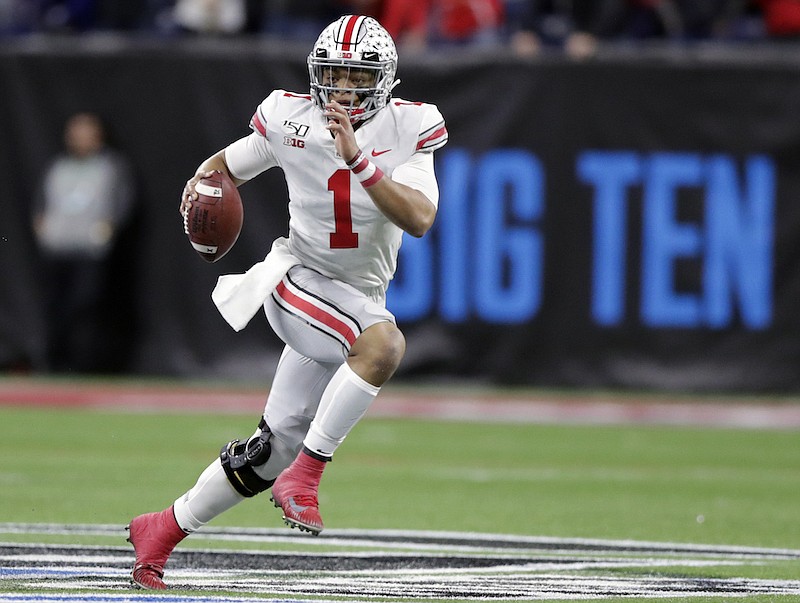To play or not to play.
That's the question - and perhaps the only question - on the mind of every college football fan, player, coach or administrator the nation over.
Does this nation collectively give in to the ongoing coronavirus pandemic, scratching the upcoming college season before it begins? Or do we throw all caution to the wind and play, hopeful that some medical miracle surfaces to protect us from ourselves?
As I write these words on Monday afternoon, rumors abound that by Tuesday afternoon the Big Ten Conference's 14 college presidents - and we wonder why the United States recently finished 30th among 35 developed countries in a worldwide math competition - will announce they are postponing the college football season until at least the spring.
It's also been rumored that Big Ten members Michigan, Nebraska and Ohio State might join the Southeastern Conference or some other league for a single season, since those schools have hinted they want to play regardless of what their league decides and the SEC, and possibly the Atlantic Coast Conference, continue to appear to be hellbent on playing.
Michigan or Ohio State playing in a temporarily altered SEC? Talk about your strange bedfellows.
Yet as Nebraska coach Scott Frost said on Monday: "I think our university is committed to playing football any way we possibly can, regardless of what anybody else does."
It wasn't just Frost, who quarterbacked the Cornhuskers to the 1997 national championship, discussing the need to play, however.
Clemson quarterback Trevor Lawrence - who might well be the 2020 Heisman Trophy winner if there is a 2020 season - not only Tweeted the following, but also so inspired President Donald Trump that POTUS retweeted it.
Wrote Lawrence: "People are at just as much, if not more risk, if we don't play. Players will all be sent home to their own communities where social distancing is highly unlikely and medical care and expenses will be placed on the families if they were to contract covid19. Without the season, as we've seen already, people will not social distance or wear masks and take the proper precautions."
Retweeted Twitter King Trump: "The student-athletes have been working too hard for their season to be cancelled. #WeWantToPlay."
He later tweeted: "Play College Football!"
A little after that, White House press secretary Kayleigh McEnany noted: "The president would very much like to see college football safely resume their sport they work their whole lives for this moment and he'd like to see (these athletes) live out their dreams."
The essence of sports is dreams. Dreams realized. Dreams denied. Dreams put on hold until a later date.
The problem with delaying all of this until a later date is that there will be no later dates for many current student-athletes. If they don't get to play their sport during the 2020-21 school year, they'll either run out of eligibility or run out of patience to join the workforce, either as an athlete going pro or as a former athlete going pro in something other than sports, as the NCAA ad campaign often says.
So here we are less than a month from when the college football season was supposed to get underway, seemingly as divided over whether to play the sport as we are over just about everything else in this country.
After all, when you've got Big Ten schools discussing the possible, if somewhat implausible notion of possibly joining the SEC or ACC for a single season - presumably much as Notre Dame is in the ACC for this football season only - how much weirder can it get?
The problem is, no one's completely right or wrong as to whether to play.
As Clemson's Lawrence wrote, players probably can be better protected and treated if they remain on campus if they're willing to follow protocols. As Trump wrote, on one level we would all probably love to see college football resume. And as bizarre as it sounds, if the only way a team such as Nebraska or Ohio State could play football was to join the SEC for a year, who really cares?
It's already guaranteed to be a season with an asterisk. Why not just pool everybody who wants to play into a giant pot, give every school four games of their choosing - Alabama-Auburn, Ohio State-Michigan, Florida-Georgia, for instance - with a computer picking the final six games of a 10-game schedule (wouldn't Ohio State-Bama or Nebraska-Oklahoma be great?), then have the College Football Playoff committee pick an eight-team playoff field?
Every team is quarantined on its own campus until game day each week. No classes. No parties. No fans. Television covers the cost of COVID-19 testing for everyone. Anyone who tests positive is out for two weeks or two negative tests, whichever comes first. The national championship is held the Sunday before the Super Bowl. Every school that decided to play gets some amount of money for its efforts.
Would it work? Should it work? Who knows?
But for anyone wondering why almost every coach and athletic director on the planet is determined to find a way to make it work, regardless of the possible human costs, Nebraska's Frost - whose school estimates it could lose $100 million or more without playing - had an ironclad answer: "People need to understand the carnage and aftermath of what college athletics looks like if we don't play."
In other words, as with so much else in life, whether right or wrong, money trumps all.
Contact Mark Wiedmer at mwiedmer@timesfreepress.com. Follow him on Twitter @TFPWeeds.

